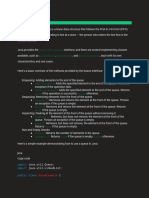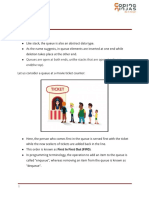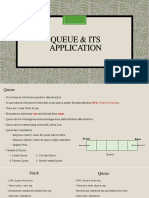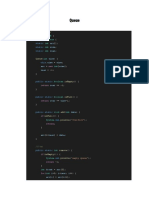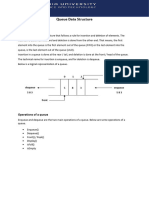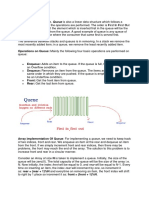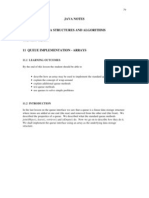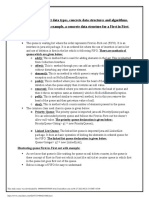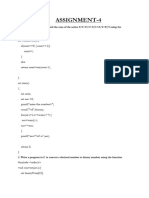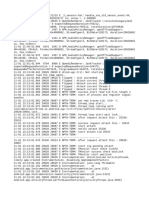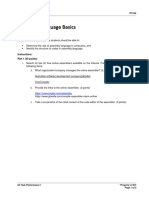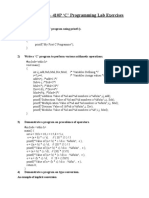Queue Interface In Java
The Queue interface is present in java.util package and extends the Collection interface is used
to hold the elements about to be processed in FIFO(First In First Out) order.
Priority Queue using Queue Interface:
import java.util.*;
public class QueueOpertions {
public static void main(String args[])
{
//Creating a Queue
Queue<String> pq = new PriorityQueue<>();
//adding values into Queue
pq.add("Lakshmi");
pq.add("Nagalakshmi");
pq.add("Mahalakshmi");
System.out.println(pq);
// removing an element
pq.remove("Nagalakshmi");
System.out.println("After Remove " + pq);
System.out.println("Poll Method " + pq.poll());
System.out.println("Final Queue " + pq);
// Iterating over the Queue
Iterator iterator = pq.iterator();
while (iterator.hasNext()) {
� System.out.print(iterator.next() + " ");
}
}
}
LinkedList using Queue Interface:
import java.util.LinkedList;
import java.util.Queue;
public class QueueExample
{
public static void main(String[] args)
{
Queue<Integer> q = new LinkedList<>();
// Adds elements {0, 1, 2, 3, 4} to the queue
for (int i = 0; i < 5; i++)
q.add(i);
// Display contents of the queue.
System.out.println("Elements of queue " + q);
// To remove the head of queue.
int removedele = q.remove();
System.out.println("removed element-" + removedele);
System.out.println(q);
// To view the head of queue
int head = q.peek();
System.out.println("head of queue-" + head);
int size = q.size();
System.out.println("Size of queue-" + size);
}
}
Queue implementation using an Array:
class Queue
{
private int[] arr; // array to store queue elements
private int front; // front points to the front element in the queue
private int rear; // rear points to the last element in the queue
private int capacity; // maximum capacity of the queue
private int count; // current size of the queue
// Constructor to initialize a queue
� Queue(int size)
{
arr = new int[size];
capacity = size;
front = 0;
rear = -1;
count = 0;
}
// Utility function to dequeue the front element
public int dequeue()
{
// check for queue underflow
if (isEmpty())
{
System.out.println("Underflow\nProgram Terminated");
System.exit(-1);
}
int x = arr[front];
System.out.println("Removing " + x);
front = (front + 1) % capacity;
count--;
return x;
}
// Utility function to add an item to the queue
public void enqueue(int item)
{
// check for queue overflow
if (isFull())
{
System.out.println("Overflow\nProgram Terminated");
System.exit(-1);
}
System.out.println("Inserting " + item);
rear = (rear + 1) % capacity;
arr[rear] = item;
count++;
}
// Utility function to return the front element of the queue
public int peek()
{
if (isEmpty())
{
System.out.println("Underflow\nProgram Terminated");
System.exit(-1);
}
� return arr[front];
}
// Utility function to return the size of the queue
public int size() {
return count;
}
// Utility function to check if the queue is empty or not
public boolean isEmpty() {
return (size() == 0);
}
// Utility function to check if the queue is full or not
public boolean isFull() {
return (size() == capacity);
}
}
class Main
{
public static void main (String[] args)
{
// create a queue of capacity 5
Queue q = new Queue(5);
q.enqueue(1);
q.enqueue(2);
q.enqueue(3);
System.out.println("The front element is " + q.peek());
q.dequeue();
System.out.println("The front element is " + q.peek());
System.out.println("The queue size is " + q.size());
q.dequeue();
q.dequeue();
if (q.isEmpty()) {
System.out.println("The queue is empty");
}
else {
System.out.println("The queue is not empty");
}
}
}



